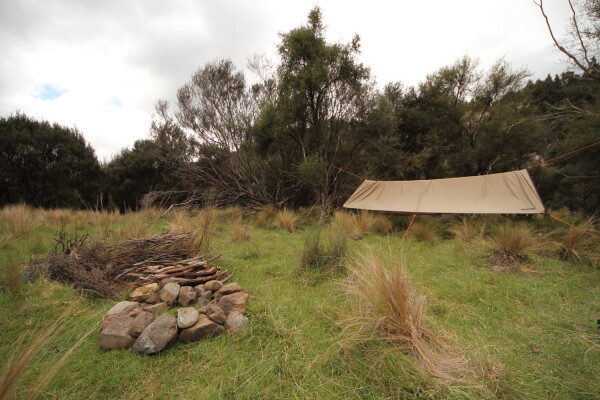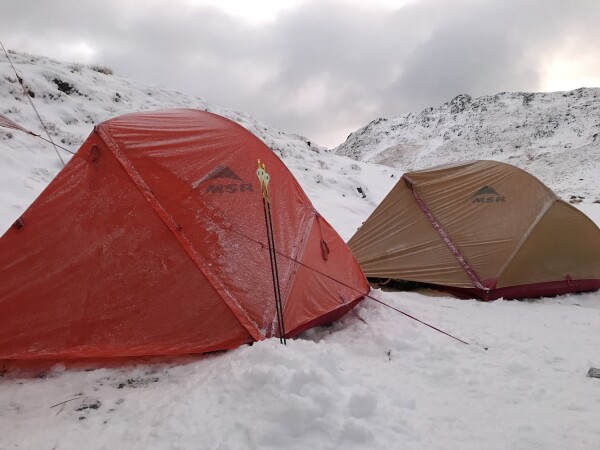Emergency Shelters to Weather Any Hunting Trip
New Zealand is a paradise for hunters, but the weather can be unpredictable and change quickly anywhere in the country. That's why it's essential to always have a trip appropriate shelter option when hunting in remote areas of the country. Chris Sharland of Hunting & Fishing New Zealand discusses the different types of emergency shelters and why they are important to have on any trip.
Emergency Bivvy Bag
A bivvy bag is a lightweight option for hunters who need a quick shelter in case of unexpected weather changes or an emergency situation such as sustaining an injury. An emergency bivvy bag should be in every hunter’s kit, as they weigh next to nothing and can be a big help in many situations. You never know when you might get caught out for the night because a sneaky sika gave you the run around so having one of these in the kit would be a game-changer.

Flys and Tarps
A fly or tarp are an excellent option for hunters who need a quick and easy shelter to protect them from the elements while they are out there, doing it. These versatile shelters can be used standalone to create shelter in any terrain or as an accessory to a tent and can make a rainy campsite substantially less miserable. They are made from waterproof and durable materials and designed to protect you from rain, wind, and sun.
Chris’ tip: Personally, I like to run a tarp over my tent in places like Fiordland or if you know you have a weather window to get through. It helps increase the dry area footprint of your tent when you’re stuck in camp for a couple of days and removes a bit of drainage worry from those torrential downpours.
Chuck one in your bag for day trips too, you never know when it might come in handy in an emergency situation.
Three-Season Tent
For hunters who like to head to the hills throughout most of the year, except the depths of winter, benefit from this shelter. A three-season tent is an excellent option for those who need a comfortable shelter at lower altitudes for the changeable spring, summer, and autumn weather conditions, and bugs. Made from lightweight materials makes them lighter to carry and easy to set up.
Chris’ tip: Try and get yourself a tent that you can run a fly and footprint only set up too. This is a great modular approach for cutting weight and I love it during late spring and late autumn when there are less bugs to contend with. It has all the benefits of a tarp but being self-supporting means, you don’t need trees or structure to tie off to.

Four-Season Tent
For the experienced mountaineer or alpine hunter extending their trips into the winter season means carrying an all-season tent. A four-season tent is a shelter that can withstand extreme weather conditions such as heavy snow, strong winds, and freezing temperatures.
Chris’ tip: They’re definitely a bit over-engineered for your average camping trip and you’ll cook yourself in summer but once you’re up high and the weather hits you can’t beat the peace of mind of both the structural integrity and weather protection of a proper four-season tent.
Having proper shelter is essential when exploring the New Zealand outdoors. Whether you're a hiker, hunter, mountaineer, or fisherman, there's a shelter option available to suit your needs. Emergency bivvy bags, flys/tarps, three-season tents, and four-season tents are all excellent options to consider when planning your next outdoor adventure. Just remember to choose a shelter that's appropriate for the weather conditions and terrain you'll be facing.
Key Learnings
- Certain weather and incident events in the backcountry of New Zealand can lead to the possibility of you being in a survival situation, it is therefore up to you to understand how to prepare for and survive these situations.
- Choose shelter based on weather and terrain – this could be bivvy bags, flys or tarps, three-season tents, and four-season tents.
Read more of our stories
- There is more than one reason to pack an emergency shelter when heading outdoors, but for hunters Doug Richards, it is simple. Read here
- Learn more about packing the right supplies here
- Find out more tips for hunting on our Big Game Hunting page